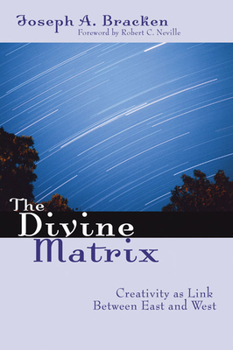The Divine Matrix
Select Format
Select Condition 
Book Overview
Dialogue among religions has always been challenging. Today the questions are becoming more fundamental: are the various traditions-Buddhist, Christian, Hindu, Tao-even talking about the same thing when they speak of Nature, of God, Emptiness or Brahma? The Divine Matrix represents a bold scholarly attempt to provide a framework for discussing these and other questions that will keep the interreligious dialogue project from grinding to a halt. In 'The Divine Matrix' philosopher and theologian Joseph Bracken first names the idea that the Infinite is the transcendent source and goal of human activity to be the notion common to virtually all the major world religions. He suggests that the Infinite is prototypically experienced not as an entity but as an ongoing activity-the principle of activity for all beings (God included). This idea is consistent with the notion of eternal and continuous motion in Aristotle, with the act of being (actus essendi) in the theology of Thomas Aquinas and Meister Eckert, and with the ground of being of Schelling and Heidegger, as well as with Whitehead's definition of creativity. Bracken goes on to show that this idea is implicit in descriptions of Brahman in the Hindu Upanishads, in the experience of pratitya-samutpada (dependent co-arising) in classical Buddhism, and in descriptions of the Tao in Tao Te Ching and Chuang Tzu. The Divine Matrix proposes that the Infinite, thus identified, be understood as a nondual reality: an activity that does not exist in itself but only in the entities which it thereby empowers to exist. This, Bracken argues, becomes the key to understanding ultimate reality within the different world religions.
Format:Paperback
Language:English
ISBN:1597525944
ISBN13:9781597525947
Release Date:March 2006
Publisher:Wipf & Stock Publishers
Length:192 Pages
Weight:0.65 lbs.
Dimensions:0.4" x 6.0" x 9.1"
Customer Reviews
1 rating
The Divine Matrix -- Process Theology Grown Up
Published by Thriftbooks.com User , 20 years ago
Process Theology is the name for a religious interpretation of reality built on the philosophy of Alfred North Whitehead. He provided a framework for seeing that all things are always in process, and that that process includes a dimension of progress. But this framework did not adquately address the deeper questions our minds can ask -- why is there something rather than nothing? or: can there be a truly ultimate meaning or purpose to all things rather than just an endless sequence of events? Joseph Bracken gives process thought the metaphysical depth it has long needed, finding in "creativity" an Ultimate Reality which can be called the divine matrix of all that happens. Bracken also compares this notion of the Ultimate to analogous ideas in Hindu and Buddhist thought, thereby uncovering an openness to transcendence in traditions of many cultures. This book is clearly for philosophers and theologians; the issues and language are not easy to deal with. But Bracken achieves what both philosophyers and theologians will recognize as a welcome clarity and directness.





